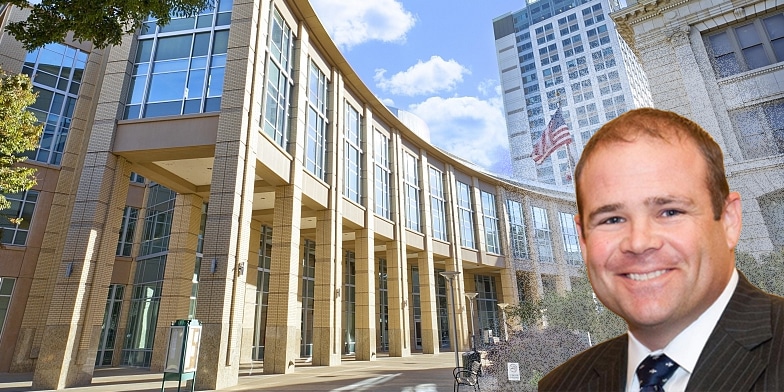Sacramento’s Pot Boss Prepares to License Marijuana Delivery in Sacramento
Sacramento has hired its first ever Commercial Cannabis Czar. Joe Devlin, 39, a former Chief of Staff for City Council member Jay Schenirer. He was recently appointed Sacramento’s Chief of Cannabis Policy and Enforcement. Under his newly assumed position, Devlin’s responsibilities will include serving as the administrator for multiple city departments as well as partnering with police and code enforcement officers to shut down hundreds of illegal gardens within residential zones.
Sacramento currently has 30 licensed marijuana dispensaries, with officials reviewing permit applications to bring an estimated 200 newly licensed commercial cultivation businesses into industrial areas within the city.
With Conditional Use Permits now available for cultivators, Joe Devlin and the city of Sacramento now have shifted their focus on licensing Manufacturers, and now even “Delivery-Only Dispensaries”. According to websites advertising marijuana delivery and city officials, there are roughly 180 unpermitted marijuana delivery services operating in Sacramento.

It is estimated that there are currently 180 marijuana delivery services operating in Sacramento. Joe Devlin hopes to create a licensing structure to allow for roughly 30 delivery services.
“There are no permitted delivery services in the city of Sacramento,” said Joe Devlin, chief of cannabis policy and enforcement with the city of Sacramento. “They are all illegal.”
Among some of the tasks Devlin has been working on, one of them includes developing a framework marijuana delivery in the City of Sacramento. “First we need to address public safety,” Devlin said. “We’re gonna evaluate best practices across the country.”
But, It’s not so simple.
There are several issues he’s working for the permit including how to track transactions, vehicles companies use, verification of the cannabis patient, insurance and locations. In fact, in a recent story on ABC Channel 10, reporters sat down with Sacramento Delivery Service Gram Up, and California Cannabis Courier Association (CCCA) President Nick Ocampo, to get the scoop.
Devlin is working with nearly every department and this permit is just one of many on his to-do list. He says there is so much to get right and it’s going to take awhile before this growing business can run legally.
City Finance Director Leyne Milstein, to whom Devlin reports, said “Joe is like the quarterback of the team” in coordinating the city’s new era of marijuana regulation.
Devlin recently answered some questions on his new challenge.
Q: What is the thinking behind designating a chief of cannabis policy and enforcement?
A: “The City Council is taking an approach that the most thoughtful and responsible way of dealing with this industry is through regulation. The city did this in recent years using pieces of different departments without a single person in charge. I think it got very clear that this was just a lot of work, and we were going to have to some person or persons dedicated to working on all of the policies, regulation and enforcement. It is a lot to do. We’ve been drinking out of a fire hose for the past few years.”
Q: Does Sacramento envision itself as a major regional hub for the cannabis industry?
A: “What we’re doing now is bringing into the light an industry that is currently here. Sacramento may have some advantages attractive to the industry: geography and relative costs of land and human capital that are less expensive than other areas of the state. There is access to freeways and SMUD, which has lower electricity costs. But I think what the industry ultimately looks like is going to be shaped by the council and the mayor.”
Q: What do you see as the economic impact?
A: “I am not an economist by trade and as to how big those numbers are or can or should be, the current market has a value reported through our dispensaries at around $113 million in (medical marijuana) sales annually. And that’s only one part of the market. As to its actual (eventual) size, I don’t think anybody will really know probably for a couple of years.”
Q: What are the opportunities you see in bringing marijuana entrepreneurs into compliance with state and local rules?
A: “There are people in this community that see regulations as a good thing, a means of coming out of the shadows. There are others who see licensing and oversight as frightening. Many of the folks that are in the commercial cannabis space are not familiar with government processes. They’re not familiar with how to go in and obtain a permit. That doesn’t mean they are bad actors or will do a poor job. They just don’t know how to navigate the process.
On the enforcement-part side of commercial cannabis, there are rules and everyone is going to have to follow them. Period. End of discussion. I think we can help the people to understand the rules and why we have the rules. But everyone is going to have to follow them.”
Q: City rules allow limited indoor cultivation for personal use in residential areas but no commercial cultivation. What about people trying to profit by breaking those rules?
A: “The other challenging side is around the illegal grows (in houses) and the folks who have been doing this for years with no desire to come into the fold. It is my hope that the legal path of commercial cultivation and manufacturing in industrial zones will be attractive and will create conditions where those (illegal) grows are not economically competitive.
But we also have folks that are going to want to do it illegally in residential communities, and that’s where we want to strengthen our enforcement tools. The grows that are problematic are the ones in neighborhoods. They are felt and seen by the neighbors. When we have calls for service and issues related to public safety, by and large, they stem from illegal residential sites.”
The cannabis industry in Sacramento is currently evolving faster than most can keep up with, and with the city open to allowing these types of businesses to operate, it should set a precedence on how other cities treat marijuana in the future. It should be interesting to see how things shake out for the future of delivery, and other marijuana businesses in Sacramento.












